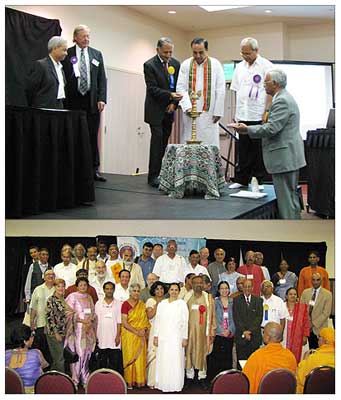 | « Back to article | Print this article |
 A three-day international conference, held between June 27 and June 29, at the University of Central Florida, Orlando, discussed how the ancient Indian wisdom of the Vedas could shape and sustain future generations in the context of social, economic, environmental, and political upheavals worldwide.
A three-day international conference, held between June 27 and June 29, at the University of Central Florida, Orlando, discussed how the ancient Indian wisdom of the Vedas could shape and sustain future generations in the context of social, economic, environmental, and political upheavals worldwide.
The conference, based on the theme 'Vedic Heritage for the Global Welfare of the Next Generation,' sought that Hindu youths be educated with these eternal values so that they could confront global problems and provide solutions.
This was the seventh international conference on Vedic studies organised by the World Association of Vedic Studies, or WAVES, a non-profit organisation registered in the United States. More than 200 scholars and delegates from North America, India and other countries participated.
A special day-long session was held for Hindu youths on June 30, organised jointly by the Hindu American Foundation and the Hindu Student Council. Young people exchanged thoughts on their heritage and how it could shape their lives and those of future generations. While the discussion was mostly for Indian-American youths, students born and raised in India said that the issues are similar there, as there is no information on this available in the education system.
Professor Madan Goel, general secretary, WAVES, and an organiser of the youth session, said, "The attendance was great and the dialogue was lively and intense between the youth and the senior generation."
Vijay Pallod, another organiser of the youth session, said he was satisfied with the deliberations. "I am glad that the organisers gave plenty of time," he said.
An inter-generation dialogue session dealt with the contemporary issues of Hindus in America. One of the issues discussed was: Is there at all a need to establish one's Hindu identity? While defining Hindu identity, measures have to be identified on how to deal with those who do not understand or appreciate the worldview of dharma, the eternal global ethic, it was noted.
 |
Interactive sessions by the youth and Vedic scholars concluded that the source of knowledge related to Hindu culture and heritage must be disseminated to the younger generation living in America and other countries outside India.
Another major topic of discussion was the portrayal of Hinduism in the Western world. In his keynote at the inauguration of the conference, Professor Francis Clooney of Harvard University outlined a series of values, including intellectual tradition of Hindus, which can benefit the religious life in America.
Professor T S Rukmani, chair of Hindu Studies at Concordia University, focused on the asset Hinduism brings to the world for today's social and environmental issues. Excited by the youth participation, Rukmani said, "I am willing to mentor them to become strong scholars of Hindu philosophy."
Aditi Banerjee, a young attorney who practices in New York City, discussed the contents of the book Invading the Sacred while Professor Nathan Katz of the Florida International University referred to the historic Hindu-Jewish Summit declaration issued in February by the chief rabbi of Israel and Swami Dayananda Saraswati, founder of the Hindu Dharma Acharya Sabha.
Katz underscored that, as Diaspora religious communities, Hindus and Jews strive to preserve tradition while adapting to new circumstances. Dr S Kalyanaraman spoke about what he described as an ongoing attack on Hindu symbols and cultural traditions.
In his banquet session keynote presentation on 'Indology and European Mythology Implications for India Today,' Rajiv Malhotra of the Infinity Foundation said the Europeans' study of India had been dominated by Germans, British and French in colonial times. Individual scholars had positive and negative agendas, and different European national interests played a key role.
Based on research on history, literature, and politics, and multivariate analysis, Malhotra said he had derived that many of the ills facing the Indian subcontinent, including today's Dravidianism and the Sri Lankan civil war are the legacies of this colonial Indology.
Indian politician Dr Subramanian Swamy, in his address at the concluding session, portrayed the framework of Hindu religious thought and philosophy that has evolved as Sanatana Dharma, and encouraged scholars to continue scholarly deliberations at forums like WAVES to bring forward the intellectualism and prowess of the tradition.
Swami Jyotirmayananda and Nachiketa Tiwari of the Hindu Mandir Executive Conference chaired a session on devising ways to use Hindu temples to disseminate Vedic values. The session, attended by local Hindu temple committee members, highlighted the importance of networking among temples, preparation of resource material for, and training of, Hindu priests and education of the youth during the formative stages of their lives on the significance of symbols and metaphors of a temple. Yogi Amrit Desai presented a workshop on Amrit Yoga.
WAVES President Dr Surendra Dwivedi said he felt relieved that a new generation of scholars is willing to promote Vedic values.
The conference was co-sponsored by the University of Central Florida, the University of Louisiana, the University of Massachusetts Dartmouth, and the Indian Council for Cultural Relations.